高二英语名词性从句
- 格式:pdf
- 大小:1.40 MB
- 文档页数:10
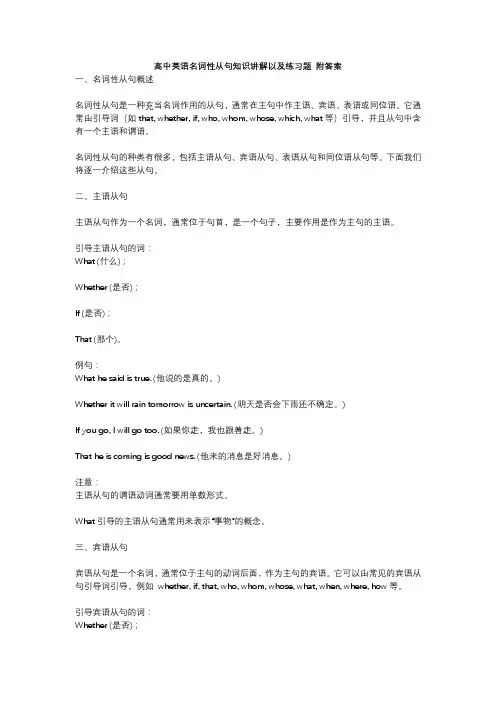
高中英语名词性从句知识讲解以及练习题附答案一、名词性从句概述名词性从句是一种充当名词作用的从句,通常在主句中作主语、宾语、表语或同位语。
它通常由引导词(如that, whether, if, who, whom, whose, which, what等)引导,并且从句中含有一个主语和谓语。
名词性从句的种类有很多,包括主语从句、宾语从句、表语从句和同位语从句等。
下面我们将逐一介绍这些从句。
二、主语从句主语从句作为一个名词,通常位于句首,是一个句子,主要作用是作为主句的主语。
引导主语从句的词:What (什么);Whether (是否);If (是否);That (那个)。
例句:What he said is true. (他说的是真的。
)Whether it will rain tomorrow is uncertain. (明天是否会下雨还不确定。
)If you go, I will go too. (如果你走,我也跟着走。
)That he is coming is good news. (他来的消息是好消息。
)注意:主语从句的谓语动词通常要用单数形式。
What引导的主语从句通常用来表示“事物”的概念。
三、宾语从句宾语从句是一个名词,通常位于主句的动词后面,作为主句的宾语。
它可以由常见的宾语从句引导词引导,例如whether, if, that, who, whom, whose, what, when, where, how等。
引导宾语从句的词:Whether (是否);If (是否);That (那个);Who (谁);Whom (谁);Whose (谁的);What (什么);When (何时);Where (何处);How (如何)。
例句:I know that he is coming. (我知道他要来。
)I wonder if he is telling the truth. (我想知道他是否说了真话。
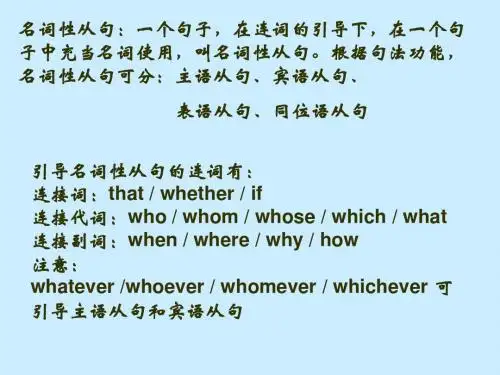
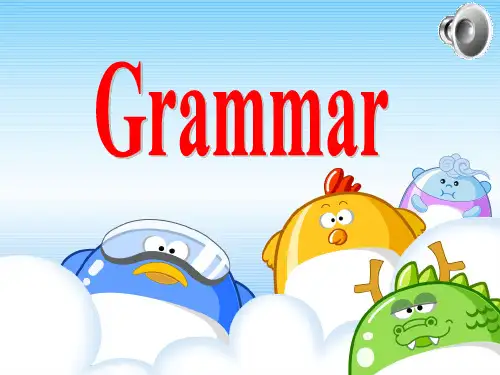
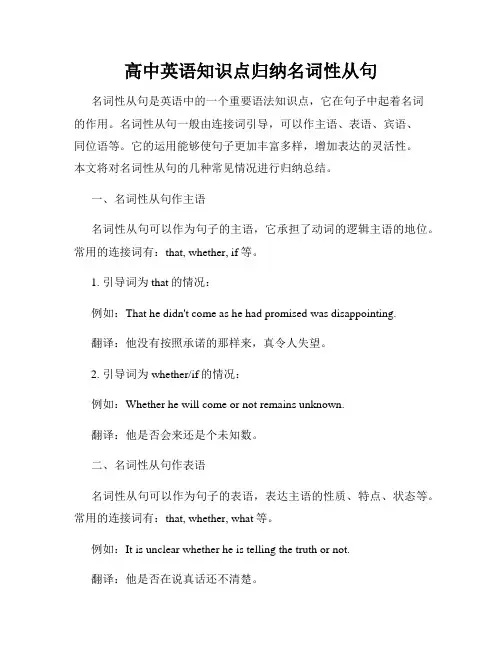
高中英语知识点归纳名词性从句名词性从句是英语中的一个重要语法知识点,它在句子中起着名词的作用。
名词性从句一般由连接词引导,可以作主语、表语、宾语、同位语等。
它的运用能够使句子更加丰富多样,增加表达的灵活性。
本文将对名词性从句的几种常见情况进行归纳总结。
一、名词性从句作主语名词性从句可以作为句子的主语,它承担了动词的逻辑主语的地位。
常用的连接词有:that, whether, if等。
1. 引导词为that的情况:例如:That he didn't come as he had promised was disappointing.翻译:他没有按照承诺的那样来,真令人失望。
2. 引导词为whether/if的情况:例如:Whether he will come or not remains unknown.翻译:他是否会来还是个未知数。
二、名词性从句作表语名词性从句可以作为句子的表语,表达主语的性质、特点、状态等。
常用的连接词有:that, whether, what等。
例如:It is unclear whether he is telling the truth or not.翻译:他是否在说真话还不清楚。
三、名词性从句作宾语名词性从句可以作为句子的宾语,接在及物动词、介词后面。
常用的连接词有:that, whether, if, what, who, whom, which, whose等。
1. 当宾语从句是及物动词的宾语时,常用连接词是that。
例如:He said that he would come tomorrow.翻译:他说他明天会来。
2. 当宾语从句是介词的宾语时,常用连接词是whether/if, 当介词为介词to时,连接词也可以用为不定式to。
例如:She is not sure about whether/if he will join us.翻译:她不确定他是否会加入我们。
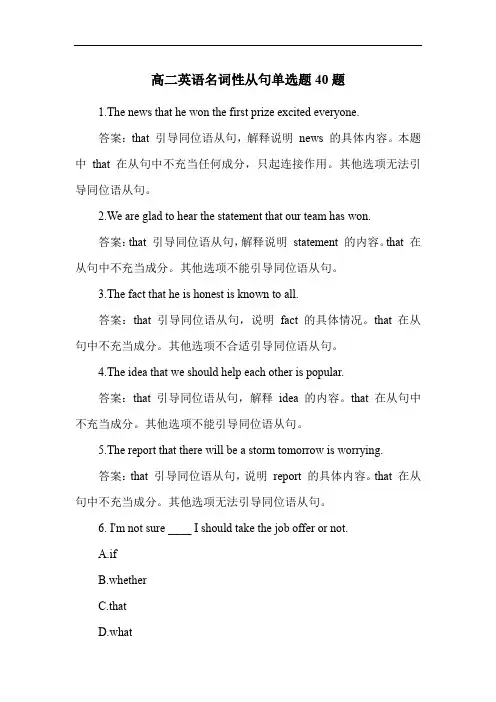
高二英语名词性从句单选题40题1.The news that he won the first prize excited everyone.答案:that 引导同位语从句,解释说明news 的具体内容。
本题中that 在从句中不充当任何成分,只起连接作用。
其他选项无法引导同位语从句。
2.We are glad to hear the statement that our team has won.答案:that 引导同位语从句,解释说明statement 的内容。
that 在从句中不充当成分。
其他选项不能引导同位语从句。
3.The fact that he is honest is known to all.答案:that 引导同位语从句,说明fact 的具体情况。
that 在从句中不充当成分。
其他选项不合适引导同位语从句。
4.The idea that we should help each other is popular.答案:that 引导同位语从句,解释idea 的内容。
that 在从句中不充当成分。
其他选项不能引导同位语从句。
5.The report that there will be a storm tomorrow is worrying.答案:that 引导同位语从句,说明report 的具体内容。
that 在从句中不充当成分。
其他选项无法引导同位语从句。
6. I'm not sure ____ I should take the job offer or not.A.ifB.whetherC.thatD.what答案:B。
本题考查whether 和if 在引导名词性从句时的区别。
whether 可以与or not 连用,而if 不可以,此句中有or not,所以选whether。
A 选项if 不能与or not 连用;C 选项that 引导的是陈述句,不符合语境;D 选项what 引导的是对事物的询问,也不符合此语境。

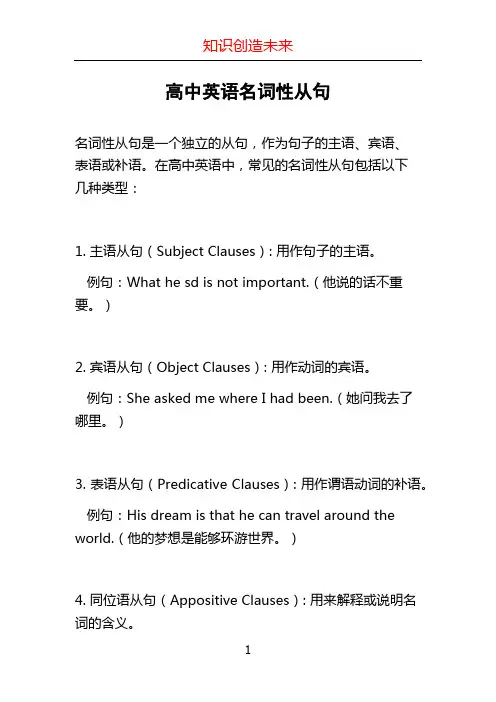
高中英语名词性从句
名词性从句是一个独立的从句,作为句子的主语、宾语、
表语或补语。
在高中英语中,常见的名词性从句包括以下
几种类型:
1. 主语从句(Subject Clauses): 用作句子的主语。
例句:What he sd is not important.(他说的话不重要。
)
2. 宾语从句(Object Clauses): 用作动词的宾语。
例句:She asked me where I had been.(她问我去了
哪里。
)
3. 表语从句(Predicative Clauses): 用作谓语动词的补语。
例句:His dream is that he can travel around the world.(他的梦想是能够环游世界。
)
4. 同位语从句(Appositive Clauses): 用来解释或说明名词的含义。
例句:The fact that he didn't show up disappointed everyone.(他没出现这个事实让每个人都感到失望。
)
5. 定语从句(Adjective Clauses): 用来修饰名词或代词。
例句:The book that I borrowed from the library is very interesting.(我从图书馆借的书非常有趣。
)
这些名词性从句在句子中起着不同的作用,能够丰富句子
的表达方式,并使句子更加准确、丰满。
在学习中,通过
大量的练习可以更好地理解和运用这些名词性从句。
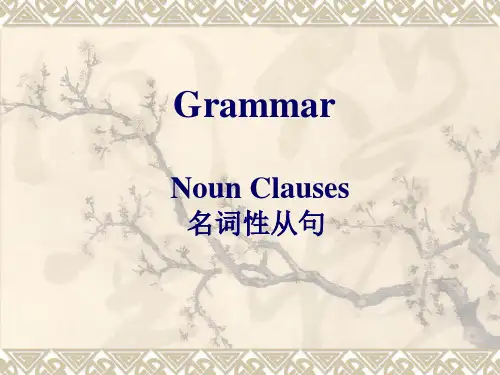
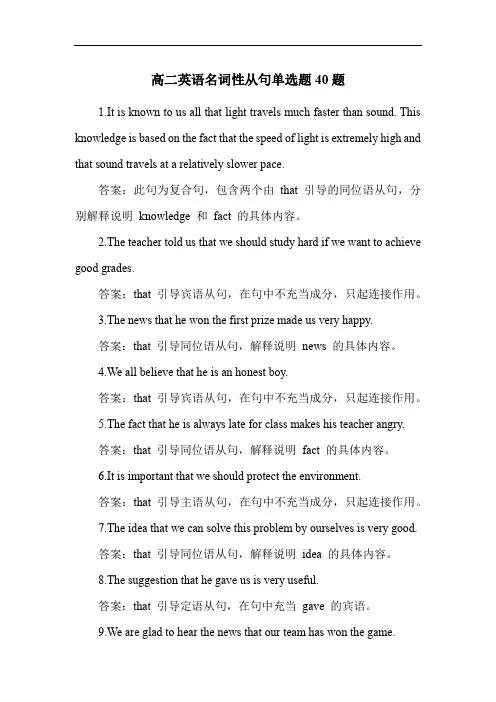
高二英语名词性从句单选题40题1.It is known to us all that light travels much faster than sound. This knowledge is based on the fact that the speed of light is extremely high and that sound travels at a relatively slower pace.答案:此句为复合句,包含两个由that 引导的同位语从句,分别解释说明knowledge 和fact 的具体内容。
2.The teacher told us that we should study hard if we want to achieve good grades.答案:that 引导宾语从句,在句中不充当成分,只起连接作用。
3.The news that he won the first prize made us very happy.答案:that 引导同位语从句,解释说明news 的具体内容。
4.We all believe that he is an honest boy.答案:that 引导宾语从句,在句中不充当成分,只起连接作用。
5.The fact that he is always late for class makes his teacher angry.答案:that 引导同位语从句,解释说明fact 的具体内容。
6.It is important that we should protect the environment.答案:that 引导主语从句,在句中不充当成分,只起连接作用。
7.The idea that we can solve this problem by ourselves is very good.答案:that 引导同位语从句,解释说明idea 的具体内容。
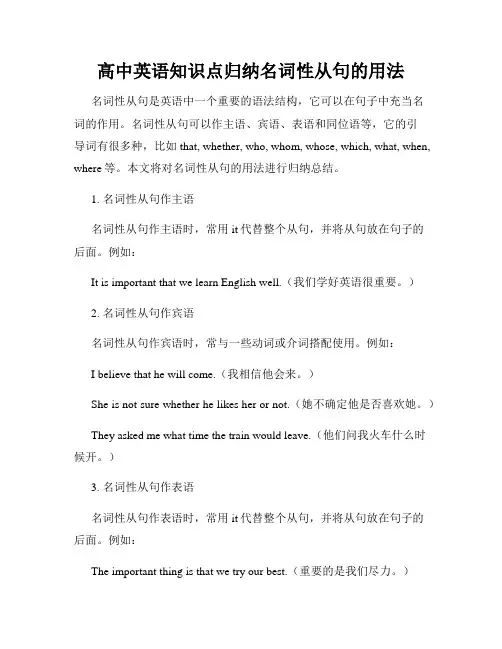
高中英语知识点归纳名词性从句的用法名词性从句是英语中一个重要的语法结构,它可以在句子中充当名词的作用。
名词性从句可以作主语、宾语、表语和同位语等,它的引导词有很多种,比如that, whether, who, whom, whose, which, what, when, where等。
本文将对名词性从句的用法进行归纳总结。
1. 名词性从句作主语名词性从句作主语时,常用it代替整个从句,并将从句放在句子的后面。
例如:It is important that we learn English well.(我们学好英语很重要。
)2. 名词性从句作宾语名词性从句作宾语时,常与一些动词或介词搭配使用。
例如:I believe that he will come.(我相信他会来。
)She is not sure whether he likes her or not.(她不确定他是否喜欢她。
)They asked me what time the train would leave.(他们问我火车什么时候开。
)3. 名词性从句作表语名词性从句作表语时,常用it代替整个从句,并将从句放在句子的后面。
例如:The important thing is that we try our best.(重要的是我们尽力。
)4. 名词性从句作同位语名词性从句作同位语时,修饰前面的名词,起进一步说明或解释的作用。
例如:The fact that he lied surprised me.(他撒谎的事实使我吃惊。
)除了以上几种常见的使用方式,名词性从句还有一些特殊的用法。
5. 名词性从句与疑问词连用名词性从句与疑问词连用时,疑问词可以是关系代词或关系副词,例如:I don't know who will come.(我不知道谁会来。
)Please tell me where you were last night.(请告诉我你昨晚在哪里。
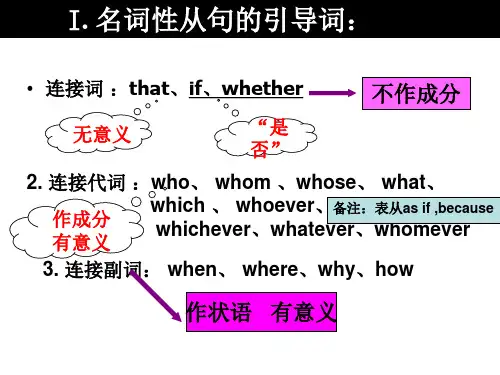
高中英语名词性从句知识点(含练习)基础回顾1.表语:表语用来说明主语的身份、性质、品性、特征和状态的,表语常由名词、形容词、副词、介词短语、动词的-ing、不定式、从句来充当,它常位于系动词(be, become, appear, seem,look,sound,feel,get,smell等词)之后。
如:Her job is selling computers. 此句表语为selling computers如果句子的表语也是由一个句子充当的,那么这个充当表语的句子就叫做表语从句。
2.同位语:一个名词(或其它形式)对另一个名词或代词进行解释或补充说明,这个名词(或其它形式)就是同位语。
如Mr. Smith,our new teacher,is very kind to us. 我们的新老师史密斯先生对我们很好。
Mr.Smith是主语our new teacher的同位语,指同一人。
同位语从句I heard the news that our team had won.我听到了我们队获胜的消息。
that our team had won 解释news的具体内容,是同位语正文一、定义在复合句中具有名词的性质的作主语、表语、同位语、宾语的从句叫名词性从句。
因此,我们把主语从句、表语从句、同位语从句和宾语从句这四种从句统称为名词性从句。
That he finished writing the composition in such a short time surprised us all他在很短的时间内写完作文让我们都很惊讶 (主语从句)The trouble is that she has lost his address. 麻烦的是她把他的地址搞丢了。
(表语从句)They have no idea at all where he has gone. 他们不知道他去什么地方了。
(同位语从句)Do you remember how he came? 你记得他怎么来的么?(宾语从句)二、语序名词性从句要采用陈述句语序。
高二英语语法名师讲解:名词性从句名词性从句相当于名词,可分别作主句的主语、表语、宾语和同位语。
因此,名词性从句可分为主语从句、表语从句、宾语从句和同位从句。
一、引导名词性从句的连接词1. 连接代词:who,whose,whom,what,which.有词义,在从句中担任成分,如主语、表语、宾语、或定语等。
2. 连接副词:when,where,why,how.有词义,在从句中担任成分,作状语。
3. 连接词:that,whether,if,as if.that 无词义,在从句中不担任成分,有时可省略;if (whether),as if虽有词义,但在从句中不担任成分。
注意:连接代词与连接副词在句中不再是疑问句,因而从句中谓语不用疑问式。
连接代词与连接副词在从句充当句子成分,连接词whether 和if(是否),as if(好像)在从句中不充当句子成分,只起连接作用。
根据句义,如果连接代词与连接副词,whether、if 和as if都用不上时,才用that作连接词(that本身无任何含义)。
二、主语从句1. 主语从句在复合句作主语。
e.g. Who will go is not important.2. 用it作形式主语,主语从句放在句末。
e.g. It doesn…t matter so much whether you will come or not.3. that引导主语从句时,不能省略。
e.g. That he suddenly fell ill last week made us surprised.三、表语从句1. 表语从句在复合句中作表语,位于系动词之后。
e.g. The question was who could go there.2. 引导表语从句的连接词that有时可省去。
e.g. My idea is (that) we can get more comrades to help in the work.四、宾语从句1. 宾语从句在复合句中作宾语。
高二语法-名词性从句专讲名词性从句是由if, whether, that 和各种疑问词充当连接词所引导的从句,其功同名词一样。
一.主语从句主语从句是在复合句中充当主语的从句,通常放在主句谓语动词之前或由形式主语it代替,而本身放在句子末尾。
1. It 作形式主语和it引导强调句的比较It 作形式主语代替主语从句,主要是为了平衡句子结构,主语从句的连接词没有变化。
而it引导的强调句则是对句子某一部分进行强调,无论强调的是什么成分,都可用连词that。
被强调部分指人是也可用who/whom。
例如:It is a pity that you didn’t go to see the film.It doesn’t interest me whether you succeed or not.It is in the morning that the murder took place.It is John that broke the window.2. 用it 作形式主语的结构(1) It is +名词+从句It is a fact that …事实是…It is an honor that…非常荣幸It is common knowledge that…是常识(2) it is +形容词+从句It is natural that…很自然…It is strange that…奇怪的是…(3) it is +不及物动词+从句It seems that…似乎…It happen ed that…碰巧…(4) it +过去分词+从句It is reported that…据报道…It has been proved that…已证实…3. 主语从句不可位于句首的五种情况(1) if 引导的主语从句不可居于复合句句首。
(2) It is said , (reported) …结构中的主语从句不可提前。
例如:It is said that President Jingo will visit our school next week. (right)That President Jiang will visit our school next week is said. (wrong)(3) It happens…, It occurs… 结构中的主语从句不可提前。
高二名词性从句的用法总结一、引言名词性从句是指在句中充当名词的从句。
在高二英语学习中,名词性从句的运用是一个较为重要的语法知识点。
掌握名词性从句的用法可以帮助我们在写作和阅读中更加准确地表达自己的意思,提升语言表达能力。
本文将总结高二名词性从句的用法,以帮助同学们更好地掌握这一知识点。
二、主语从句主语从句通常出现在句子的主语位置,引导词有:that, whether, who, whom, which等。
例句:1. Whether we should go on a picnic tomorrow is still under discussion.2. Who will take care of the baby is the main concern for the parents.三、宾语从句宾语从句通常出现在句子的宾语位置,引导词有:that, whether, if, what, who, whom, which, when, where, why等。
例句:1. I don't know what she wants for her birthday.2. The teacher asked whether we had finished our homework.四、表语从句表语从句通常用来对主语进行补充说明,引导词有:that, whether, who, whom, which等。
例句:1. His biggest hope is that he can study abroad.2. What makes her happy is that she passed the exam.五、同位语从句同位语从句通常用来对前面的名词进行解释或者说明,引导词有:that, whether, what等。
例句:1. The fact that he failed the exam disappointed his parents.2. I heard the news that they are getting married.六、宾语补足语从句宾语补足语从句通常出现在某些及物动词(如:think, believe, find, feel等)、感官动词(如:see, hear等)、使役动词(如:make, let, have等)后面,引导词有:that, whether, if, what, who, whom, which等。